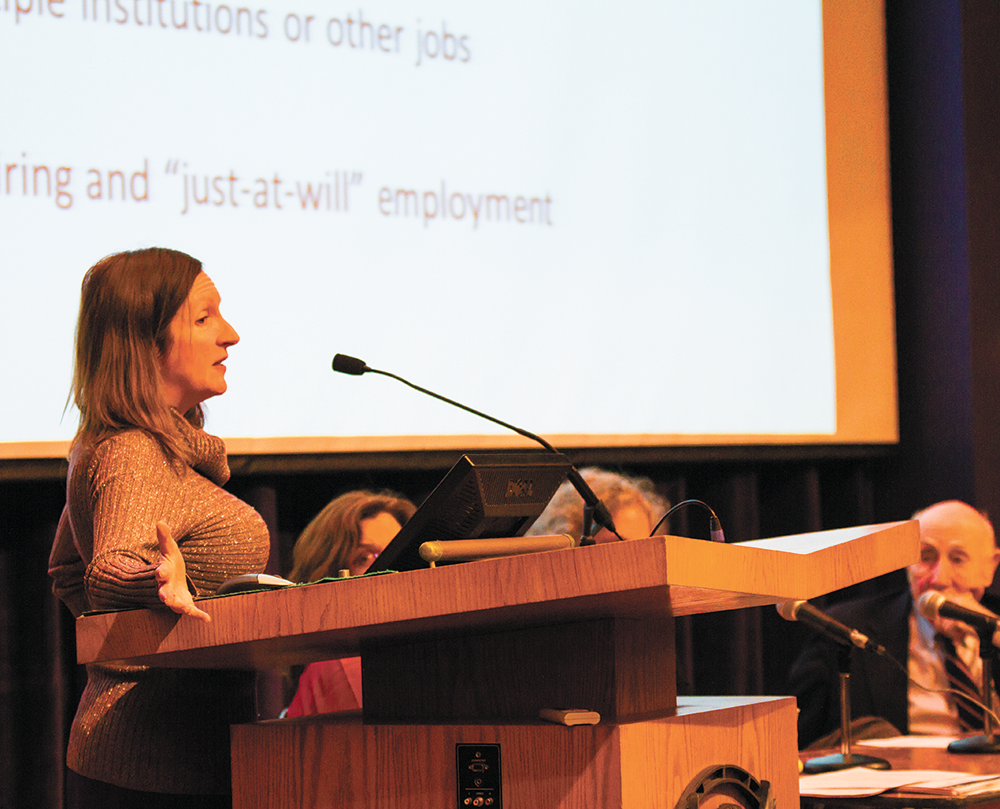
SEIU Director of Research and Strategic Planning Anne McLeer rallied the crowd at a panel on adjuncts Wednesday.
During this event, which was sponsored by the Georgetown University Student Association, adjunct-professor panelists discussed the strides that have been made since May 2013, when adjunct professors at the university voted to unionize and join the Services Employees International Union 500.
“It’s just unfair to have people doing the same work, held to the same expectations, with the same qualifications and expertise and the same dedication … to have these people underpaid and excluded and offered no benefits,” SEIU Director of Research and Strategic Planning Anne McLeer said to the audience.
The conference, which was attended by about a dozen students, also examined student involvement in the unionization of adjunct professors at Georgetown; it proved minimal when compared to similar movements at other colleges like American University.
“Somehow, at Georgetown, there was not very much student activity, and I think that’s a shame. I think in the future, in organized efforts, every effort must be made to get the students involved,” adjunct faculty member Pablo Eisenberg said.
In addition to issues involving pay, benefits and job protection, the adjuncts described the difficulties they face when finding jobs as full-time professors.
“Unfortunately, what happens is that there is a bias against adjuncts themselves, which is counter-intuitive because we do all have the same qualifications [as full-time professors],” adjunct professor Kerry Danner-McDonald (COL ’93) said. “More or less, the longer you stay adjunct, the less likely it is that you will ever be hired for a full-time position. It’s almost like you have a shelf life.”
Adjunct professors were buoyed in their efforts with the January release of a report by the Council for Higher Education Accreditation, which concluded that the quality of education at universities is compromised by a lack of institutional support for adjunct professors. CHEA proposed fundamental changes in the accreditation process for colleges and universities with large numbers of non-tenure-track faculty members.
“Given that NTTFs make up the majority of faculty on most campuses, they should be provided a significant voice and attention in the accreditation process during the self-study process and campus visits,” the report said.
Eisenberg felt that the report called on administrators to directly respond to the needs of adjunct faculty members.
“I think that [the report is] some momentum in pushing administrators to be fairer in their treatment of adjuncts, particularly since the working conditions of teachers affect the quality of education that students receive. I think it’s a welcome report,” Eisenberg said.
According to the report, poor working conditions for non-tenure-track faculty members negatively impact students and lead to decreased graduation and retention rates. Daniel Maxey, who co-authored the report, believes that accrediting schools have been receptive to its findings thus far.
“Ultimately, accreditors are very concerned with the quality of academic programs at colleges and universities,” Maxey said. “You’ve got a situation where a majority of the faculty at many institutions are facing working conditions that impede their ability to serve their students and to provide the highest quality instruction possible. … The accreditors that we work with believe that this is an issue that needs to be addressed.”
Georgetown’s adjunct professors are currently working with the university to forge solutions to these problems. SEIU has reached tentative agreements with the university that will be included in a contract voted on by adjunct professors. These agreements include the assurance of a safe working environment, the creation of a Labor Collaboration Committee that will meet between negotiations to discuss issues of mutual interest and equal academic-freedom rights for part-time and full-time faculty members.
“We have presented proposals on various issues, and then both sides roll their sleeves up and make suggestions as to how to resolve these issues. It’s a much more collaborative process than I think people imagine,” McLeer said.
So far, negotiations between the bargaining committee and the university have proceeded amiably.
“Negotiations are going very well,” McLeer said. “They’re very productive, very collegiate and very collaborative. Both sides are working together to resolve some of the issues that adjuncts face at Georgetown.”
However, some adjunct professors feel that little progress has been made since the union was formed last year.
“I haven’t seen much activity on the university’s side so far. The university was very open about the vote [to unionize] and didn’t try to influence our votes, but I haven’t seen much change yet,” said Natalie Goldring, an adjunct professor in the Center for Security Studies. “I would like to see the university address the question of working conditions. I’d also like to see them address benefits.”
Goldring, who has worked at Georgetown as both a full-time and adjunct faculty member, said that her workload was unchanged by her status. She therefore feels that the discrepancy in the working conditions of full-time and adjunct professors is unwarranted.
“I don’t think that adjunct professors in the Security Studies Program provide a lower quality of teaching, and I don’t think we provide a lower-quality learning experience for our students,” Goldring said.
Vice-Provost for Faculty Adriana Kugler did not respond to requests for comment.














